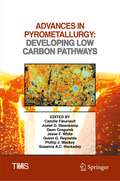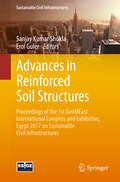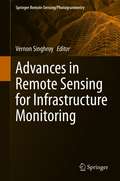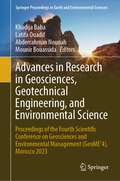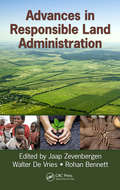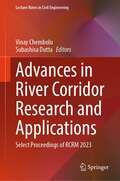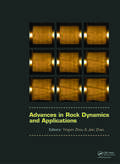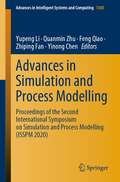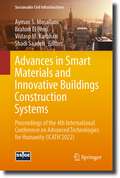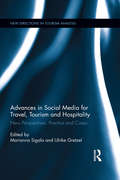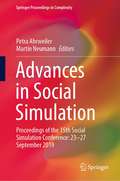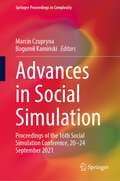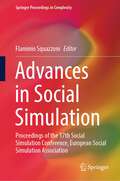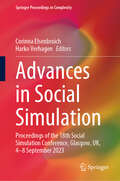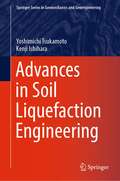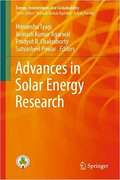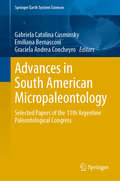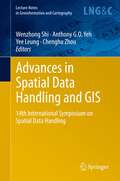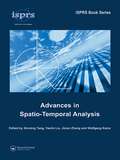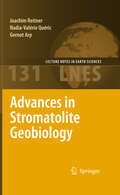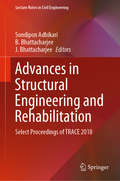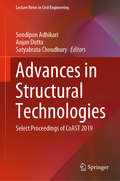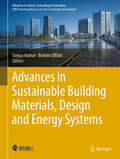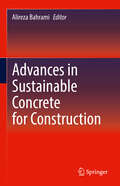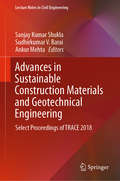- Table View
- List View
Advances in Pyrometallurgy: Developing Low Carbon Pathways (The Minerals, Metals & Materials Series)
by Dean Gregurek Camille Fleuriault Jesse F. White Joalet D. Steenkamp Quinn G. Reynolds Phillip J. Mackey Susanna A.C. HockadayCarbon intensive industries are at a crossroads. Long-term manufacturing plans using pyrometallurgical processes all include decarbonization levers: we must solve the problem of fossil-based reduction and fossil-based power generation processes for metals production. This collection explores innovative and diverse strategies for the enablement of low carbon industries in the high-temperature metals and materials processing fields. In particular, the following processes are investigated:· Electrolysis and electrification of metallurgical processes · High-temperature electrolytic routes for metal and alloy production · Use of hydrogen and other alternative non-carbonaceous reducing agents · Biofuels and other non-fossil reagents for metallurgical applications · Direct and indirect use of solar energy in high-temperature processing · Energy efficiency and waste heat recovery concepts applied to pyrometallurgical operations
Advances in Reinforced Soil Structures: Proceedings of the 1st GeoMEast International Congress and Exhibition, Egypt 2017 on Sustainable Civil Infrastructures (Sustainable Civil Infrastructures)
by Sanjay Kumar Shukla Erol GulerSoil reinforcement is a very useful technique to construct several cost-effective soil structures in an environmentally friendly and sustainable manner. The most commonly used reinforcement materials are galvanised steel strips, geosynthetics in the form of woven geotextiles, geogrids and geocomposites, and fibres from natural and waste products. In recent years, there have been advances in the area of soil reinforcement, especially in the utilization of the technique in field projects. The researchers have also been working to understand the behaviour of reinforced soil considering the field challenges of reinforced soil structures. This edited volume contains contributions on advances in reinforced soil structures, mainly flexible pavements, footings, embankments, stone columns/piles, and slopes, as covered in the subject areas of geosynthetic engineering and fibre-reinforced soil engineering. The first paper by Ioannis N. Markou presents the details of sand-geotextile interaction based on interface tests with conventional and large-scale direct shear equipment. The second paper by Atef Ben Othmen and Mounir Bouassida examines the interface properties of geosynthetic reinforcement by carrying out inclined plane tests under low confinement adapted to landfill covers conditions. The third paper by J. N. Jha, S. K. Shukla, A. K. Choudhary, K. S. Gill1 and B. P. Verma deals with the triaxial compression behaviour of soil reinforced with steel and aluminium solid plates in horizontal layers. The fourth paper by M. Muthukumar and S. K. Shukla describes the swelling and shrinkage behaviour of expansive soil blended with lime and fibres. The fifth paper by S. G. Shah, A. C. Bhogayata and S. K. Shukla provides the test results of shear strength of cohesionless soil reinforced with metalized plastic waste. The sixth paper by Bouacha Nadjet compares the geotextile-reinforced and geogrid-reinforced flexible pavements based on numerical analyses. The seventh paper by S. Kumar, C. H. Solanki, J. B. Patel, P. B. Sudevan and P. M. Chaudhary reports the results of laboratory model tests carried out on a square footing resting on prestressed geotextile reinforced sand. The eighth paper by Sanoop G and Satyajit Patel presents the numerical studies on ground improvement using geosynthetic reinforced sand layer. The ninth paper by ------------------- discusses the bearing capacity prediction of inclined loaded strip footing on reinforced sand by ANN. The tenth paper by Mohamad B. D. Elsawy presents the numerical simulation of an embankment, constructed on reinforced soft soil with conventional stone piles. The eleventh paper by N. O. Sheta and R. P. Frizzi deals with the analysis, design, construction and monitoring of a geosynthetics-reinforced-earth pile-supported embankment serving as an access road. The twelfth paper by S. Banerjee, A. Adhikari, S. Chatterjee and D. Das provides the details of a case study on reinforced slope on soft soil for the approach of a major bridge. We do hope the researchers and the engineers may find the contributions in this volume very useful. This volume is part of the proceedings of the 1st GeoMEast International Congress and Exhibition on Sustainable Civil Infrastructures, Egypt 2017.
Advances in Remote Sensing for Infrastructure Monitoring (Springer Remote Sensing/Photogrammetry)
by Vernon SinghroyThis volume provides international case studies of practical and advanced methods using satellite images integrated with other airborne, drone images and field data to monitor infrastructure. The book is timely, as infrastructure spending by national governments is increasing and robust monitoring techniques are needed to keep pace with climate change impacts affecting infrastructures globally. The expert international contributions that comprise the book provide examples of advanced methods using InSAR, high-resolution optical and radar images, LIDAR, UAV, geophysical techniques and their applications to civil infrastructure. The case studies focus on high-resolution, rapid time-series radar interferometry to monitor highways, railways, pipelines, bridges, urban, and water conveyance infrastructures. Other case studies use optical and radar images to characterize urban infrastructure and monitor damages from floods, oil spills and conflicts. The case studies are global focusing on infrastructure projects in Canada, Dominica Guyana, India Italy, Syria Taiwan, United States and the United Kingdom. This compilation of selected case studies will provide useful guidelines for the civil infrastructure characterization and monitoring communities. The book will be of interest to infrastructure consultants and professionals, scientific communities in earth observation and advanced imaging methods, and researchers and professors in earth sciences, climate change, and civil and geoengineering.
Advances in Research in Geosciences, Geotechnical Engineering, and Environmental Science: Proceedings of the Fourth Scientific Conference on Geosciences and Environmental Management (GeoME’4), Morocco 2023 (Springer Proceedings in Earth and Environmental Sciences)
by Mounir Bouassida Khadija Baba Latifa Ouadif Abderrahman NounahThe industrial acceleration intensifies the negative environmental impacts, mainly in some very sensitive geographical areas. Environmental problems like water stress, deadly floods, scarcity of building materials, and prolonged periods of drought affect southern countries, including African nations. This book comprises the peer-reviewed proceedings of the fourth scientific conference on geosciences and environmental management (GeoME'4), held in Salé, Morocco, on June 22–24, 2023. The book interests all researchers, practitioners, and students in geosciences, the environment, and water management.The book delivers a comprehensive overview of the latest research covering the following aspects of green technologies for sustainable water and wastewater management: nature-based solutions in the water cycle and advanced technologies in geosciences, geotechnics, and the environment. Additionally, it features six keynote speakers by international experts, providing valuable insights and further enhancing its value as a comprehensive resource on the following topics: Water management Environmental engineeringGeosciences and geotechnical engineering
Advances in Responsible Land Administration
by Jessica KeyesAdvances in Responsible Land Administration challenges conventional forms of land administration by introducing alternative approaches and provides the basis for a new land administration theory. A compilation of observations about responsible land administration in East Africa, it focuses on a new empirical foundation rather than preexisting ideal
Advances in River Corridor Research and Applications: Select Proceedings of RCRM 2023 (Lecture Notes in Civil Engineering #470)
by Subashisa Dutta Vinay ChemboluThis book presents the select proceedings of the 3rd International Conference on River Corridor Research and Management (RCRM 2023). It describes various topics on fluvio-hydro-ecological processes of river systems. The topics covered include river dynamics and morphological changes, river health and ecological aspects and satellite remote sensing for river corridor studies. The book also discusses the morphological behavior of gravel and sand-bed rivers, hydrological and hydraulics modeling and other important aspects of riverine ecology. The book will be a valuable reference for researchers and professionals working in the areas of river science.
Advances in Rock Dynamics and Applications
by Jian Zhao Yingxin ZhouThe study of rock dynamics is important because many rock mechanics and rock engineering problems involve dynamic loading ranging from earthquakes to vibrations and explosions. The subject deals with the distribution and propagation of loads, dynamic responses, and processes of rocks and rate-dependent properties, coupled with the physical environm
Advances in Simulation and Process Modelling: Proceedings of the Second International Symposium on Simulation and Process Modelling (ISSPM 2020) (Advances in Intelligent Systems and Computing #1305)
by Quanmin Zhu Yinong Chen Feng Qiao Yupeng Li Zhiping FanThis book gathers the selected papers from the Second International Symposium on Simulation and Process Modelling (ISSPM 2020), which was held online on August 29-30, 2020, due to COVID-19 pandemic. The Symposium provides a forum in virtual presentation for scholars, researchers and practitioners who are interested in the modelling and simulation of business processes, production and industrial processes, service and administrative processes, and public sector processes to develop theory and practice of simulation and process modelling.
Advances in Smart Materials and Innovative Buildings Construction Systems: Proceedings of the 4th International Conference on Advanced Technologies for Humanity (ICATH'2022) (Sustainable Civil Infrastructures)
by Brahim El Bhiri Ayman S. Mosallam Vistasp M. Karbhari Shadi SaadehThis book contains a comprehensive guide to the latest developments in building and bridge construction. The book covers a wide range of topics, including the use of advanced materials such as fiber-reinforced polymer (FRP) composites and the incorporation of smart technologies into design and construction of buildings and bridges.The book discusses advantages of using FRP composites in building and bridge construction. It then goes on to explore the use of smart technologies, such as sensors and structural health monitoring systems, to improve performance and safety of structures. It also covers the use of advanced concrete and masonry materials and methods, including high-performance concrete, self-consolidating concrete, and advanced masonry systems.The book is written for engineers, architects, and construction professionals and provides a detailed overview of the latest research and developments in the field. It includes case studies and practical examples to illustrate key concepts and techniques, making it an invaluable resource for those involved in building and bridge construction. With its comprehensive coverage of the latest advances in building and bridge construction, "Advances in Concrete, Masonry and FRP Composite Smart Buildings and Bridges" is an essential guide for anyone looking to stay current with the latest trends and technologies in the industry.
Advances in Social Media for Travel, Tourism and Hospitality: New Perspectives, Practice and Cases (New Directions in Tourism Analysis)
by Ulrike Gretzel Marianna SigalaThis book brings together cutting edge research and applications of social media and related technologies, their uses by consumers and businesses in travel, tourism and hospitality. The first section addresses topical issues related to how social media influence the operations and strategies of tourism firms and help them enhance tourism experiences: open innovation, crowdsourcing, service-dominant logic, value co-creation, value co-destruction and augmented reality. The second section of the book looks at new applications of social media for marketing purposes in a variety of tourism-related sectors, addressing crowd-sourced campaigns, customer engagement and influencer marketing. The third section uses case studies and new methodologies to analyze travel review posting and consumption behaviors as well as the impact of social media on traveller perceptions and attitudes, with a focus on collaborative consumption and sharing economy accommodation. Finally, the fourth section focuses on hot topics and issues related to the analysis, interpretation and use of online information and user-generated content for deriving business intelligence and enhancing business decision-making. Written by an international body of well-known researchers, this book uses fresh theoretical lenses, perspectives and methodological approaches to look at the practical implications of social media for tourism suppliers, destinations, tourism policy makers and researchers alike. For these reasons, it will be a valuable resource for students, managers and academics with an interest in information and communication technologies, marketing for tourism and hospitality, and travel and transportation management.
Advances in Social Simulation: Proceedings of the 15th Social Simulation Conference: 23–27 September 2019 (Springer Proceedings in Complexity)
by Martin Neumann Petra AhrweilerThis book presents the state of the art in social simulation as presented at the Social Simulation Conference 2019 in Mainz, Germany. It covers the developments in applications and methods of social simulation, addressing societal issues such as socio-ecological systems and policymaking. Methodological issues discussed include large-scale empirical calibration, model sharing and interdisciplinary research, as well as decision-making models, validation and the use of qualitative data in simulation modeling. Research areas covered include archaeology, cognitive science, economics, organization science and social simulation education.This book gives readers insight into the increasing use of social simulation in both its theoretical development and in practical applications such as policymaking whereby modeling and the behavior of complex systems is key. The book appeals to students, researchers and professionals in the various fields.
Advances in Social Simulation: Proceedings of the 16th Social Simulation Conference, 20–24 September 2021 (Springer Proceedings in Complexity)
by Bogumił Kamiński Marcin CzuprynaThis book covers the latest advances in applying agent-based modelling in social sciences. The Social Simulation Conference is the major global conference devoted to this topic. It is aimed at promoting social simulation and computational social science. This year’s special theme is “Social Simulation geared towards Post-Pandemic times”, focused not only on questions raised by the current pandemic but also on future challenges related to economic recovery, such as localization, globalization, inequality, sustainable growth and social changes induced by progressive digitalization, data availability and artificial intelligence. The primary audience of this book are scholars and practitioners in computational social sciences including economics, business, sociology, politics, psychology and urban studies.
Advances in Social Simulation: Proceedings of the 17th Social Simulation Conference, European Social Simulation Association (Springer Proceedings in Complexity)
by Flaminio SquazzoniThis book highlights recent developments in the field of computer simulation and its application to social dynamics and behaviour. It covers latest advancements in the use of agent-based modelling by focusing on thematic issues, methodological progress and applications, including policy, industry and business. It aims to promote this interdisciplinary type of research by showing synergies, complementary and integration especially between computer sciences, social sciences, economics and organization, often bridging qualitative and quantitative research. The primary audience of this book are academics, practitioners and professionals using computer simulation for business counselling or industry.
Advances in Social Simulation: Proceedings of the 18th Social Simulation Conference, Glasgow, UK, 4–8 September 2023 (Springer Proceedings in Complexity)
by Corinna Elsenbroich Harko VerhagenThis book contains the proceedings of the 18th Social Simulation Conference (SSC) and covers the state of the art of social simulation modeling. The SSC is the annual conference of the European Social Simulation Association (ESSA) and the major global conference devoted to this topic. It is aimed at promoting social simulation and computational social science. The book is the biggest collection of agent-based modeling research. It covers all aspects of modeling, from theory and philosophy of modeling to question of model design, purpose, and structure, using data, visualization, model interrelation, and open modeling. This book is targeted at researchers in social simulation regardless of disciplinary backgrounds, across career stages and different sectors, such as academia, industry, and policy
Advances in Soil Liquefaction Engineering (Springer Series in Geomechanics and Geoengineering)
by Yoshimichi Tsukamoto Kenji IshiharaThis book describes recent developments in soil liquefaction engineering and introduces more appropriate procedures than the current ones to evaluate triggering and consequences of soil liquefaction during earthquakes. The topics therefore cover all aspects of soil behaviour following liquefaction during earthquakes. The contents start with new approaches and new findings on characterisation of liquefaction resistance and undrained shear strength of fully saturated, partially saturated, and unsaturated sand, which are fully based on laboratory tests. New approaches and findings are then described on the use of in situ sounding tests for characterising triggering and consequences of soil liquefaction, including post-liquefaction settlement, lateral spreading, and stability against flow slide. All the topics are accompanied by illustrative case history data from recent major earthquakes in Japan.
Advances in Solar Energy Research (Energy, Environment, and Sustainability)
by Avinash Kumar Agarwal Himanshu Tyagi Prodyut R. Chakraborty Satvasheel PowarThis book covers major technological advancements in, and evolving applications of, thermal and photovoltaic solar energy systems. Advances in technologies for harnessing solar energy are extensively discussed, with topics including the fabrication, compaction and optimization of energy grids, solar cells and panels. Leading international experts discuss the applications, challenges and future prospects of research in this increasingly vital field, providing a valuable resource for all researchers working in this field.
Advances in South American Micropaleontology: Selected Papers of the 11th Argentine Paleontological Congress (Springer Earth System Sciences)
by Gabriela Catalina Cusminsky Emiliana Bernasconi Graciela Andrea ConcheyroThis book offers many examples of calcareous microfossils and describes a new microfaunistic record in Argentina. These selected papers of the 11th Argentine Paleontological Congress include micropaleontological studies on material of different geological ages from several sites in Argentina and Colombia. The authors highlight several geological findings and explain the paleoenvironmental changes in Argentina and Colombia.
Advances in Spatial Data Handling and GIS: 14th International Symposium on Spatial Data Handling (Lecture Notes in Geoinformation and Cartography)
by Anthony G.O. Yeh Yee Leung Chenghu Zhou Wenzhong ShiThis book provides a cross-section of cutting-edge research areas being pursued by researchers in spatial data handling and geographic information science (GIS). It presents selected papers on the advancement of spatial data handling and GIS in digital cartography, geospatial data integration, geospatial database and data infrastructures, geospatial data modeling, GIS for sustainable development, the interoperability of heterogeneous spatial data systems, location-based services, spatial knowledge discovery and data mining, spatial decision support systems, spatial data structures and algorithms, spatial statistics, spatial data quality and uncertainty, the visualization of spatial data, and web and wireless applications in GIS.
Advances in Spatio-Temporal Analysis
by Xinming Tang Yaolin Liu Jixian Zhang Wolfgang KainzDevelopments in Geographic Information Technology have raised the expectations of users. A static map is no longer enough; there is now demand for a dynamic representation. Time is of great importance when operating on real world geographical phenomena, especially when these are dynamic. Researchers in the field of Temporal Geographical Infor
Advances in Stromatolite Geobiology (Lecture Notes in Earth Sciences #131)
by Joachim Reitner Gernot Arp Nadia-Valérie QuéricStromatolites are the most intriguing geobiological structures of the entire earth history since the beginning of the fossil record in the Archaean. Stromatolites and microbialites are interpreted as biosedimentological remains of biofilms and microbial mats. These structures are important environmental and evolutionary archives which give us information about ancient habitats, biodiversity, and evolution of complex benthic ecosystems. However, many geobiological aspects of these structures are still unknown or only poorly understood. The present proceedings highlight the new ideas and information on the formation and environmental setting of stromatolites presented at the occasion of the Kalkowsky Symposium 2008, held in Göttingen, Germany.
Advances in Structural Engineering and Rehabilitation: Select Proceedings of TRACE 2018 (Lecture Notes in Civil Engineering #38)
by Sondipon Adhikari B. Bhattacharjee J. BhattacharjeeThis book comprises select papers presented at the International Conference on Trends and Recent Advances in Civil Engineering (TRACE 2018). The book covers a wide range of topics related to recent advancements in structural engineering, structural health monitoring, rehabilitation and retrofitting of structures, and earthquake-resistant structures. Based on case studies and laboratory investigations, the book highlights latest techniques and innovative methods for building repair and maintenance. Recent development in materials being used in structural rehabilitation and retrofitting is also discussed. The contents of this book can be useful for researchers and professionals working in structural engineering and allied areas.
Advances in Structural Technologies: Select Proceedings of CoAST 2019 (Lecture Notes in Civil Engineering #81)
by Sondipon Adhikari Anjan Dutta Satyabrata ChoudhuryThis book comprises select proceedings of the National Conference on Advances in Structural Technology (CoAST 2019). It brings together different applied and technological aspects of structural engineering. The main topics covered in this book include solid mechanics, composite structures, fluid-structure interaction, soil-structure interaction, structural safety, and structural health monitoring. The book also focuses on emerging structural materials and the different behavior of civil, mechanical, and aerospace structural systems. Given its contents, this book will be a useful reference for researchers and practitioners working in structural safety and engineering.
Advances in Sustainable Building Materials, Design and Energy Systems (Advances in Science, Technology & Innovation)
by Sanjay Kumar Brahim ElBhiriThis book is a great opportunity to make the research community discuss the dangerous environmental challenges such as climate change and its huge effects in addition to the world's reliance on fossil fuel and non-renewable resources. In recent years, the authors have been focused on the advancements of technology and how it can improve our lives, but the authors often overlook the fact that it is creating an unsustainable approach that comes at a high cost which makes a sustainable approach to cities necessary, focusing on accessible public transport, energy, water, and food security, and regenerating compact fabric areas. To discuss how to reach this sustainable approach, IEREK held the Advances in Energy Research, Materials Science and Built Environment (EMBE) conference from October 3 to 4, 2024, with attendees from all over the world. It provides an opportunity to exchange ideas and solutions on urban planning, sustainable architecture, climate change mitigation, and innovative design. The EMBE conference hosts a variety of knowledgeable keynote speakers and researchers who discussed the integration of technology in sustainable urban planning, green urbanism, preservation of coastal areas, innovative renewable materials, and responsive architecture. The book covers a wide range of scientific knowledge that can lead humanity toward a sustainable and greener future.
Advances in Sustainable Concrete for Construction
by Alireza BahramiThis book offers groundbreaking insights into transforming the concrete industry with innovative, environmentally conscious solutions. It explores the latest advancements in sustainable technologies, including climate-improved concrete, green binders, recycled materials, and high-performance composites. It also covers the optimization of reinforced concrete structures, load-bearing columns and beams replacements, as well as non-destructive testing methods for predicting concrete performance. Additionally, it investigates engineered cementitious composites, internally cured concrete, and industrial by-products to address pressing environmental challenges in construction. An indispensable reference for engineers, architects, and researchers shaping the future of sustainable infrastructure and reducing carbon footprints
Advances in Sustainable Construction Materials and Geotechnical Engineering: Select Proceedings of TRACE 2018 (Lecture Notes in Civil Engineering #35)
by Sanjay Kumar Shukla Sudhirkumar V. Barai Ankur MehtaThis book comprises select papers presented at the International Conference on Trends and Recent Advances in Civil Engineering (TRACE 2018). The topics covered include the utilization of industrial by-products as construction materials, sustainable and green materials in construction applications, and latest measures adopted for stabilization techniques. The book also discusses recent advances and techniques related to geotechnical and concrete domain that can be used as a reference guide for various researchers and practitioners around the globe.
